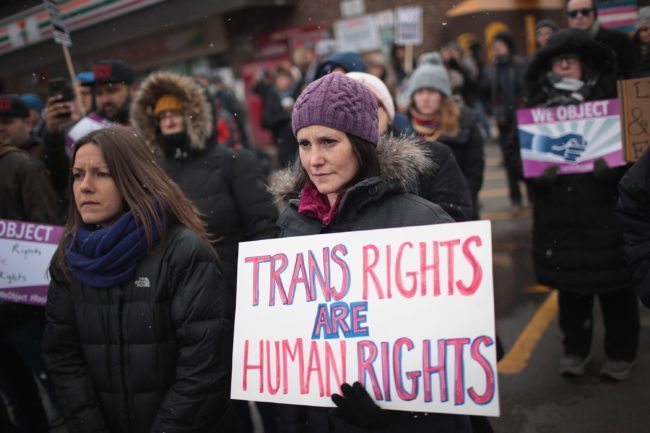Teacher who said transgender women aren’t women did nothing wrong, says disciplinary hearing

(Creative Commons)
A maths teacher who posted a series of anti-trans comments online has been cleared of all charges at a disciplinary hearing.
Roy Wilkes, a Manchester-based secondary school teacher, wrote the three-paragraph post to 7,000 members on a National Union of Teachers (NUT) Facebook page.
The teacher said that trans women are not women.
He also described giving children puberty-blocking drugs – which are reversible – as “a form of child abuse”.

(Photo by Scott Olson/Getty Images)
The teacher added – incorrectly – that children could become dependent on hormonal drugs, adding that many children change their minds about their gender after puberty.
Wilkes was accused of making “grossly discriminatory (transphobic) statements…that were damaging to the mental health of members” and that brought the NUT into disrepute, of harassing trans members and of harassing Annette Pryce, LGBT executive member of the NUT, who made the complaint, according to The Times.
But the national disciplinary committee of the NUT has dismissed all three of the charges.
The teacher got involved in the Facebook debate after defending vice-president of the NUT, Kiri Tunks’s newspaper article warning readers that if the legal definition a man or woman is relaxed, the repercussions could be that the sex discrimination law is rendered meaningless.
Members reacted angrily to Wilkes on the page, taking issue with the fact that he didn’t think trans women were women.
One trans member of the Facebook group told The Times that “transphobic posts on the union’s Facebook page have been really impacting my levels of dysphoria.”

(BBC)
Speaking about Wilkes’ comment that trans women are not women, they said that “that comment made me feel physically sick, and the palpitations that I’ve been suffering from started again”.
Wilkes, a member of the Labour Party and the NUT, said he was shocked to be brought up on the charges, adding: “I have fought all my life for equality and against discrimination”.
He added that the decision was “an important blow for freedom of speech and for the right of people to question and disagree with the prevailing narrative on self-identification and gender.”
If he had lost the case, he would have been expelled from the union and would have been disciplined at his place of work.
The “freedom of speech” excuse which he referenced here has been repeatedly used to justify hateful rhetoric in the US and Australia.

